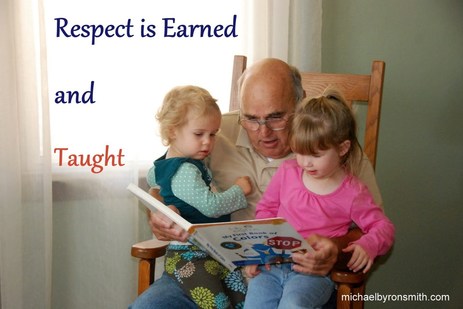
You’ve heard it before. “Kids ‘these days’ have no respect for anything. They don’t value what they have. They are spoiled, think they are entitled to things they haven’t worked for, and have little regard for what their parents or other elders say”… But is that true?
It Depends
I think lacking respect is true for some young people and not true for others--and it has been true since the ancient times of Plato and Socrates. What is certainly true is that some cultures demand respect more than others, especially when it involves elders. Culture in any society is a blueprint for those living within it. A positive cultural blueprint is a great asset for parents when raising their children because society is not fighting against them.
In America, our culture is less formal than many. Many young people don’t look at elders as mentors. They consider older adults as out-of-touch, behind the times, and lacking credibility. Technology has contributed to this because kids and young adults pick up on technology more quickly and forget that knowledge is more than Snapchat, virtual reality, and dexterity with smartphones. With our culture and the technology related snobbery of younger people, it becomes more important for parents to instill respect; and it isn’t too difficult to tell those who have, or have not, been taught that most important quality.
But it’s not just parents who have an impact on young people. Friends, teachers, the mini-society they live within, social media, pop culture, can all shape a child throughout their growth into adults. The hope is that responsible parents can be the strongest and most trusted influencers. Ultimately, respect is taught through example and reasonable expectations. Parents are normally (and hopefully) the best examples and act in the best interests of their children.
What is Respect?
Respect is not just about how you treat others. One can have respect for danger, authority, status, accomplishments, talent, position, among other things. Respect is honor, fear, love, position, stature, patience, courtesy, recognition, reverence, admiration, and tolerance.
You can have respect for someone’s position without admiration, or you can respect a person because of your admiration for them. Respect can save one’s life or limb by acknowledgment of one’s abilities compared to a threat. Respect can be a tool of success when applied honestly. Respect is an acknowledgement of an earned position and having the patience to wait your turn. Respect is honoring the knowledge of others and sacrifices they have made. Respect can be the golden rule. Showing respect to someone means you act in a way that shows you care about their feelings and well-being. While being liked is desirable, being respected is crucial to be effective in any endeavor.
Summary
Kids need to understand respect in all the ways it applies. How are they going to do that? Will understanding respect come to them through positive experience, making mistakes, through osmosis, observation, or their DNA? Not likely very quickly and not very well. Therefore, moms and dads need to do the best they can. They need to be the examples of respect while encouraging their children to follow in their footsteps. Hopefully, they have had the mentorship themselves to know respect and how to pass it on to their children. Most effective parents will raise children who will be successful. Most ineffective parents will raise children who will have much difficulty being successful. It’s that simple!
Read "The Power of Dadhood" for more discussion on being an effective father.





